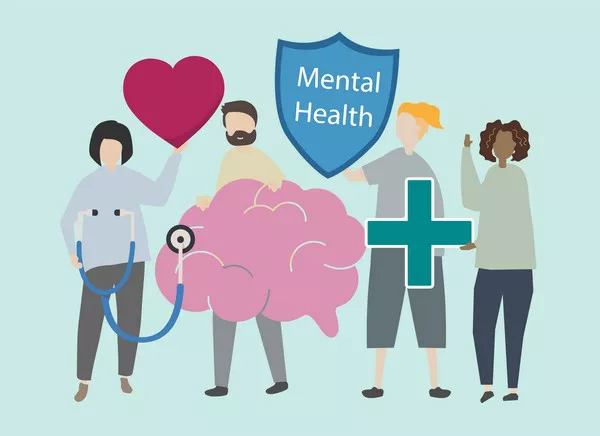Mental health is a crucial aspect of our overall well-being, yet it is often overlooked or misunderstood. Mental disorders can affect anyone, regardless of age, gender, or background, and recognizing their signs is essential for effective intervention and support. This article aims to provide a detailed guide on how to identify mental disorders, the importance of early detection, and the steps to take if you or someone you know may be struggling.
Understanding Mental Disorders
Mental disorders, also referred to as mental illnesses, are conditions that affect a person’s thinking, feeling, behavior, and overall functioning. They can significantly impact daily life, relationships, and physical health. According to the World Health Organization (WHO), mental disorders are among the leading causes of disability worldwide, affecting millions of people.
Common categories of mental disorders include:
Anxiety Disorders: Characterized by excessive fear or worry, including generalized anxiety disorder, panic disorder, and social anxiety disorder.
Mood Disorders: Such as depression and bipolar disorder, which involve significant changes in mood and emotional state.
Psychotic Disorders: Including schizophrenia, which affects perception and reality.
Personality Disorders: Involving enduring patterns of behavior, cognition, and inner experience that deviate from cultural expectations.
Eating Disorders: Such as anorexia nervosa and bulimia, which involve preoccupations with food, body weight, and shape.
Common Signs and Symptoms
Identifying mental disorders involves recognizing a range of signs and symptoms. While each disorder has its specific characteristics, many share common features. Here are some key indicators to look out for:
Emotional Changes
Persistent Sadness or Low Mood: Feelings of hopelessness, emptiness, or despair that last for weeks or longer.
Irritability or Anger: Increased frustration or mood swings, often over trivial matters.
Anxiety and Worry: Constant feelings of nervousness or fear that interfere with daily activities.
Behavioral Changes
Social Withdrawal: Avoiding friends, family, and activities that were once enjoyable.
Changes in Routine: Disruption in daily habits, such as neglecting personal hygiene or responsibilities.
Increased Substance Use: Using alcohol, drugs, or other substances to cope with emotional pain.
Cognitive Difficulties
Concentration Problems: Difficulty focusing on tasks, making decisions, or remembering information.
Negative Thoughts: Persistent thoughts of worthlessness, guilt, or self-blame.
Delusions or Hallucinations: Experiencing false beliefs or seeing/hearing things that are not present (common in psychotic disorders).
Physical Symptoms
Unexplained Physical Ailments: Chronic pain, fatigue, or other physical symptoms without a clear medical cause.
Changes in Sleep Patterns: Insomnia, hypersomnia (excessive sleeping), or disrupted sleep cycles.
Altered Appetite: Significant weight loss or gain due to changes in eating habits.
Risky Behaviors
Self-Harm: Engaging in behaviors that intentionally cause harm to oneself, such as cutting or burning.
Suicidal Thoughts or Actions: Expressing thoughts about wanting to die or making plans for self-harm.
The Importance of Early Identification
Recognizing mental disorders early is crucial for several reasons:
Improved Prognosis: Early intervention can lead to better treatment outcomes and a higher quality of life.
Access to Resources: Individuals can benefit from appropriate therapies, medications, and support systems.
Reduced Stigma: Increasing awareness and understanding can help combat the stigma surrounding mental health issues.
Steps to Take If You Suspect a Mental Disorder
If you or someone you know is showing signs of a mental disorder, consider the following steps:
Educate Yourself
Understanding mental health is the first step toward recognizing disorders. Read reputable sources, attend workshops, or engage with mental health professionals to gain knowledge about various conditions and their symptoms.
Encourage Open Dialogue
Create a safe and supportive environment for discussions about mental health. Encourage individuals to express their feelings and experiences without fear of judgment. Active listening can foster trust and openness.
Seek Professional Help
Consult a mental health professional, such as a psychologist, psychiatrist, or licensed therapist. They can conduct a comprehensive assessment and provide a diagnosis if necessary. Treatment options may include therapy, medication, or a combination of both, tailored to the individual’s needs.
Offer Support
If someone close to you is struggling, offer your support. Encourage them to seek help and let them know you are there for them. Simple gestures, such as checking in or spending time together, can make a significant difference.
Monitor Progress
If treatment is initiated, keep track of changes in symptoms and overall well-being. Regular follow-ups with healthcare providers are essential for effective management and adjustment of treatment plans as needed.
Promoting Mental Health Awareness
In addition to individual efforts, promoting mental health awareness within communities is vital. Here are some ways to contribute:
Advocate for Mental Health Education: Support initiatives that promote mental health education in schools, workplaces, and community organizations.
Participate in Awareness Campaigns: Engage in events and campaigns that focus on mental health awareness, such as Mental Health Month or World Mental Health Day.
Challenge Stigma: Speak out against stigma and discrimination related to mental health. Share personal experiences if comfortable, as this can help others feel less alone.
Conclusion
Identifying mental disorders is a critical step toward recovery and well-being. By understanding the signs and symptoms, we can create a culture of awareness and support that encourages individuals to seek help. Remember, mental health is just as important as physical health, and seeking assistance is a sign of strength. If you or someone you know is struggling, don’t hesitate to reach out for help. Together, we can foster an environment of understanding and compassion, paving the way for better mental health for all.
Related Topics:
- Why Self Esteem Is Important For Mental Health
- Why Rest Is Important For Mental Health?
- What To Do To Have A Good Mental Health?


